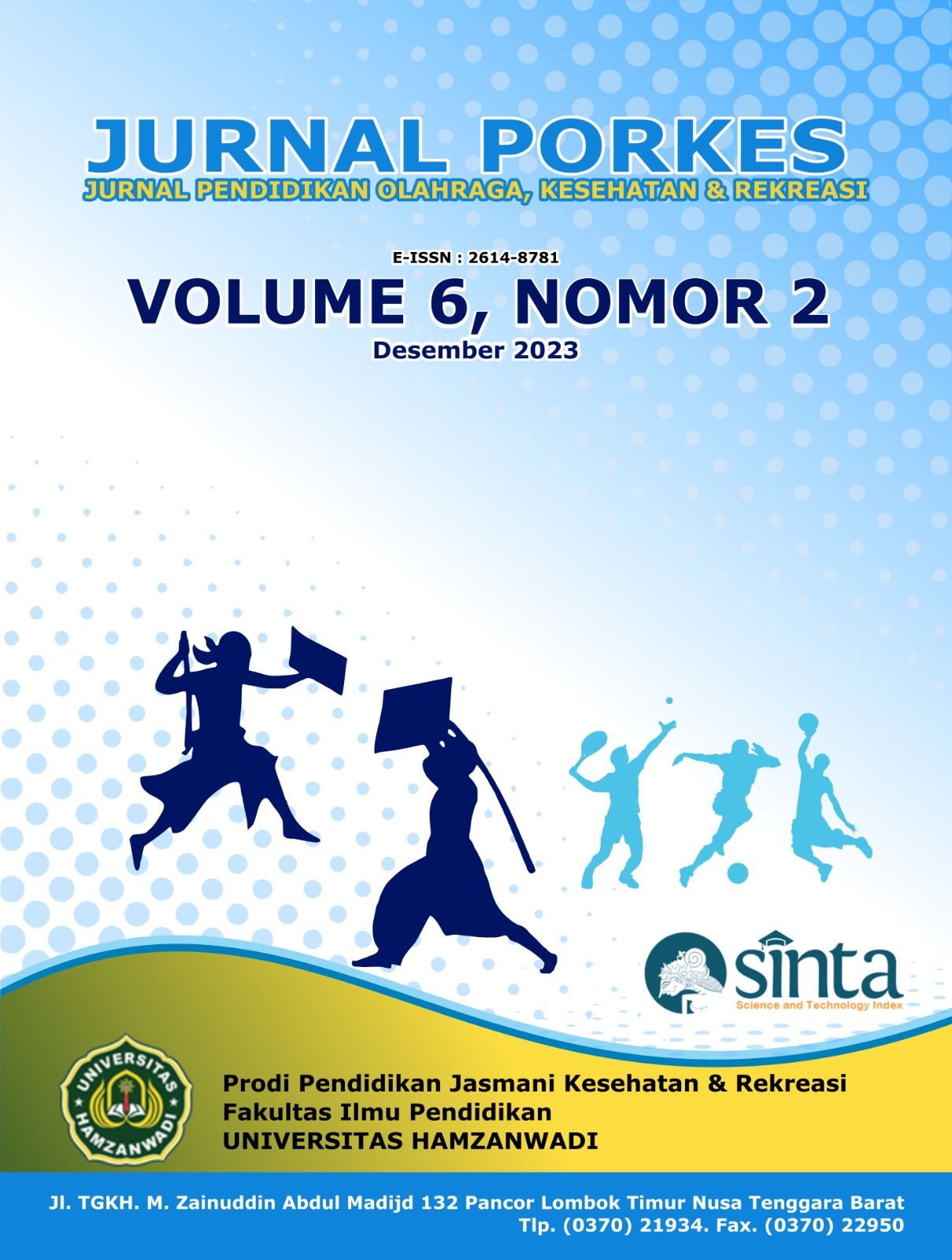Implementasi permainan tradisional lombok dalam meningkatkan kebugaran jasmani
DOI:
https://doi.org/10.29408/porkes.v6i2.24229Keywords:
Implementation, Lombok traditional games, physical fitness.Abstract
The purpose of this study was to examine the implementation of traditional Lombok games in improving physical fitness in grade V elementary school students. This study used a quasi experimental design (pretest and posttest) research method, the research design used was a pre one group pretest-posttest design. The sampling technique in this study was simple random sampling. The number of samples used in this study were 33 fifth grade students with an age of 10 years. This research instrument uses TKJI before and after implementation. The results of the pretest physical fitness assessment average value of 12 with a physical fitness category of less, while the posttest average value of 17 with a moderate physical fitness category, the results of data analysis from the study showed the output of the independent samples test, obtained a value of Sig. (2-tailed) = 0.000 <0.05. So the traditional Lombok game for grade V students aged 10 years has significant implementation benefits. Based on these results, it is concluded that it can show the importance of the implementation of traditional Lombok games which can provide benefits to improve proper physical fitness in later life.
References
Akhimullah, A. R., Hamidi, A., & Ugelta, S. (2023). Prestasi Olahraga Nasional Ditinjau dari Anggaran Kementerian Pemuda dan Olahraga Tahun 2020-2022. Jurnal Ilmu Keolahragaan, 22(2), 210–218. https://jurnal.unimed.ac.id/2012/index.php/JIK/article/view/51435
Alpen, J., Dlis, F., Hernawan, Widiastuti, Apriani, L., Kurniawan, E., & Sofyan, D. (2022). Trends in Scientific Publication of Traditional Game Learning Models in Physical Education and Sports in Indonesia: A bibliometric Analysis. Journal Sport Area, 7(2), 214–226. https://doi.org/10.25299/sportarea.2022.vol7(2).9072
Anggita, G. M. (2019). Eksistensi Permainan Tradisional sebagai Warisan Budaya Bangsa. Jossae : Journal of Sport Science and Education, 3(2), 55. https://doi.org/10.26740/jossae.v3n2.p55-59
Depdiknas. (1999). Tes Kebugaran Jasmani Indonesia ( TKJI ) (Vol. 1200).
Direktorat Jenderal Kebudayaan Departemen Pendidikan dan Kebudayaan. (1981a). Permainan Anak-Anak Daerah NTB.
Departemen Pendidikan dan Kebudayaan.
Direktorat Jenderal Kebudayaan Departemen Pendidikan dan Kebudayaan. (1981b). Permainan Rakyat Daerah NTB. Departemen Pendidikan dan Kebudayaan.
Direktorat Jenderal Kebudayaan Departemen Pendidikan dan Kebudayaan. (1981c). Permainan Rakyat Daerah Nusa Tenggara Barat. Departemen Pendidikan dan Kebudayaan.
Firmansyah, G., & Rahayu, E. D. (2019). Model Pembelajaran Gerak Dasar Melompat melalui Modifikasi Permainan Tradisional Engklek pada Anak Sekolah Dasar. Journal of Teaching Physical Education in Elementary School, 2(14), 111–117. https://doi.org/10.17509/tegar.v2i2.17822
Gustian, U., Supriatna, E., & Purnomo, E. (2019). Efektifitas Modifikasi Permainan Tradisional dalam Pengembangan Physical Literacy Anak Taman Kanak-Kanak. Jurnal Keolahragaan, 7(1), 23–33. https://doi.org/10.21831/jk.v7i1.22166
Irmansyah, J., Lumintuarso, R., Sugiyanto, F. X., & Sukoco, P. (2020). Children’s Social Skills Through Traditional Sport Games in Primary Schools. Jurnal Cakrawala Pendidikan, 39(1), 39–53. https://doi.org/10.21831/cp.v39i1.28210
Jariono, G., & Wulandari, W. (2022). Upaya Meningkatkan Kebugaran Jasmani Menggunakan Model Pembelajaran Kooperatif Tipe Jigsaw. Jurnal Porkes, 5(1), 245–259. https://doi.org/10.29408/porkes.v5i1.5493
Jatmiko, A. B., & Syaukani, A. A. (2023). Survei Tingkat Kebugaran Jasmani Atlet Remaja Akademi Basket Rookie. Jurnal Porkes, 6(1), 119–135. https://doi.org/10.29408/porkes.v6i1.7823
Jaydari, M., Rouzbahani, M., & Hasanvand, R. (2016). The Effect of traditional Games the Development of Transfer and Manipulation Motor Skills in Boys With Mental Retardation. International Journal of Physical Education, Sports and Health 2016, 3(6), 134–136. https://www.kheljournal.com/archives/2016/vol3issue6/PartC/3-6-13-843.pdf
Kacar, D., & Ayaz-Alkaya, S. (2022). The Effect of Traditional Children’s Games on Internet Addiction, Social Skills and Stress Level. The International Society Of Psychiatric Mental-Health Nurses The, 40, 50–55. https://doi.org/10.1016/j.apnu.2022.04.007
Kancanadana, G., Saputri, O., & Tristiana, V. (2021). The Existence of Traditional Games as a Learning Media in Elementary School. International Conference on Early and Elementary Education (ICEEE), 4, 31–39.
https://publikasiilmiah.ums.ac.id/xmlui/handle/11617/12536
Keliat, P., Lubis, A. E., & Helmi, B. (2019). Profil Tingkat Kebugaran Jasmani dan Kecukupan Gizi. Jurnal Ilmiah Stok Bina Guna Medan, 7(2), 46–54. https://doi.org/10.55081/jsbg.v7i2.12
Kourti, A., Stavridou, A., Panagouli, E., Psaltopoulou, T., Tsolia, M., Sergentanis, T. N., & Tsitsika, A. (2021). Play Behaviors in Children during the COVID-19 Pandemic : A Review of the Literature. https://doi.org/10.3390/children8080706
Kurniawan, E., Tangkudung, J., Widiastuti, Warta, D., Wk, C., & Alpen, J. (2020). The Effectiveness of Local Wisdom-Based Games In Improving Physical Fitness In Children 9 Aged. International Journal of Psychosocial Rehabilitation, 24(08), 2995–3004. https://doi.org/10.37200/IJPR/V24I8/PR280318
Maksum, A. (2018). Metodologi Penelitian dalam Olahraga. Unesa University Press.
Mandigo, J., Francis, N., Lodewyk, K., & Lopez, R. (2017). What is the relationship between Physical Education and Physical Literacy 57(6). https://doi.org/10.18666/TPE-2017-V74-I3-7459
Marmeleira, J., Ferreira, S., & Raimundo, A. (2017). Physical activity and physical fitness of nursing home residents with cognitive impairment : A pilot study. Journal Experimental Gerontology, 100(15), 63–69. https://doi.org/10.1016/j.exger.2017.10.025
Marmeleira, J., Ms, L. G., & Raimundo, A. (2017). Exercise merging physical and cognitive stimulation improves physical fitness and cognitive functioning in older nursing home residents: a pilot study. Geriatric Nursing. https://doi.org/10.1016/j.gerinurse.2017.10.015
Mujriah, Siswantoyo, Sukoco, P., Rosa, F. O., Susanto, E., & Setiawan, E. (2022). Traditional Sport Model To Improve Fundamental Movement Skills and Social Attitudes of Students During Covid-19. Physical Education Theory and Methodology, 22(3), 309–315. https://doi.org/10.17309/tmfv.2022.3.02
Rakhman, A., & Wibawa, B. (2019). Character learning through traditional games urang banjar. International Journal of Innovation, Creativity and Change, 8(11), 172–180. https://www.ijicc.net/images/vol8iss11/81111_Rakman_2019_E_R.pdf
Rumpoko, S. S., Jayanti, K. D., Febrianti, R., Hakim, A. R., Sunjoyo, S., & Sistiasih, V. S. (2022). Tingkat Kebugaran Jasmani Mahasiswa Prodi Pendidikan Olahraga. Jurnal Porkes, 5(1), 260–271. https://doi.org/10.29408/porkes.v5i1.5635
Sudarwo, R., Kurniawan, E., Irmansyah, J., Balkis, M., & Esser, R. N. L. (2023). The effectiveness of Lombok traditional games on increasing physical literacy of elementary school. Jurnal Keolahragaan, 11(1), 95–103. http://doi.org10.21831/jk.v11i1.58316 This
Sugiyono. (2017). Model Penelitian Kuantitatif, Kualitatif, dan R&D. alfabeta.
Suharjana, F. (2011). Pengembangan Pembelajaran Senam melalui Bermain di Sekolah Dasar. Jurnal Pendidikan Jasmani Indonesia, 8(1), 18–23. https://journal.uny.ac.id/index.php/jpji/article/view/3479
Tangkudung, J., Aini, K., & Puspitorini, W. (2019). Development of Physical Fitness Materials based on Traditional Games for Junior High School. Advances in Social Science, Education and Humanities Research, 178(ICoIE 2018), 424–428. https://doi.org/10.2991/icoie-18.2019.91
Watchman, T., & Spencer-Cavaliere, N. (2017). Times have changed: Parent perspectives on children’s free play and sport. Psychology of Sport and Exercise, 32, 102–112. https://doi.org/10.1016/j.psychsport.2017.06.008
Downloads
Published
How to Cite
Issue
Section
License
![]()
Jurnal Porkes is licensed under a Creative Commons Attribution-Share Alike 4.0 International License







